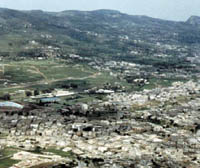
In Ibb, the history & civilization,First Tourist Festival Activities [Archives:2003/663/Reportage]
August 28 2003
 |
Tawfik Hassan A'gha
For the Yemen Times
The first Tourist Festival in Ibb governorate was inaugurated in, Ba'dan, and Hab Fort in August 14, which is nominated to be a provincial future tourist capital.
This comes out of a belief that Ibb had been covered with a green carpet from time immemorial and had hosted one f the great human civilizations possessing various kinds of wealth and treasures. Ibb was one of the governorates in which the ancient Yemeni civilization had thrived. The city of Ibb is distinguished by its antique tourism location and cultural wealth.
At the gate of Hab fort, an interview with Mr. Khaled Ali al Anisi, general manager of antiquities and museums in Ibb was conducted.
Q: Would you tell us about Ibb as a historical tourist site?
A: Ancient Yemeni man had left behind a valuable heritage of historical places which cast light on how the way human life was throughout different ages. Ibb is really distinguished by its architecture, mosques, water canals and dams, antiquities and ornaments and above all the fertility of its land. Ibb visitor can enjoy a journey into the history and civilization, historical sites, museums and the beautiful city of Jibla. He can view the valleys and mountains covered with a green carpet all over the year.
Q: How do you prove the existence of the Stone Age in the city?
A: Ibb opens a history page dating back to the modern Stone Age. The Stone Age (3000-6000 century BC) was famous for growing plants and breeding animals and some traces were found of the old activities of mankind during the Stone Age e.g. the different sizes and forms of tools, fishing tools, small hammers and beads made of stones.
The American archaeological research team found traces of the Stone Age in some areas of al Sada and Hazm al Udain districts. They found small-sized arrows with sharp points made in a skilled way in al Ud Mountain.
In the Bronze Age (2000-3000 BC) the high lands were supplied with water from rains and it was in this age the inhabitants used pottery substances in the areas of valleys in the governorate.
Q: How do you value the archaeological discoveries made by the German team?
A: Al Ud Mountain is dated to the Qatabani period. An old inhabitation was also discovered that happened to be ruined and burned in the 3Rd century BC.
Traces of the inhabitation had provided historical information about the bilateral trade relations between Yemen and the Mediterranean Sea countries and their influence on Yemeni arts.
Q: What is the role of Ibb in the historical events of the first Yemen Islamic
country?
A: The fall of the Himiarite city in the 6th century BC did not block the way of the Yemeni human ambitions in Ibb. And in the Islamic era, the role of the Yemenis was prominent in forming the historical events. They participated in the Islamic conquests in the east and west among which was Thoraeen tribe.
In the 9th century A.D., Ibb witnessed the establishment of the Ali bin al Fadhl state and Mothaykerah was its capital and from which he extended his power to include Aden, Abyan, Lahj, Taiz and Sana'a. In the 12th century A.D., Ibb experienced
political conflicts resulting in the ruin of its castles and forts and the establishment of the Ayobi state. In the Rasulaids era, al Rasooli al Modafar king ruled Hab fortification in 1248. In the reign of The Rasuliah state, following the Ayobi state, Ibb flourished in many aspects. Many mosques and schools were built in Ibb, Jibla and Thi al Sofal., e.g. Al Naemia School, Al Sharafya School and many others in Daras Rebat al Borihi and al Ga'shen.
In the Taheri era, 923 H.D., Ibb constituted a strategical location connecting the power headquarter with the west and south districts of the state. Hab fortification was a treasury of the Sultan A'mer bin Abdulwahab properties.
In the modern history, Ibb people contributed effectively to the fight against the Ottoman occupation, building fortifications and castles to block the enemy advance.
Q; Recently, the random diggings in al Udain have resulted in the discovery of antiques treasure, would you explain?
A: The farmers in al Akhmas area, al Udain in Ibb have made the discovery of old silver coins dated back to the 8th century A.D. , specially in the era of sultan , al Malik al Abbas bin al Mujahid Ali . The national museum in Ibb keeps only 4 coins and we have instructed to search for the rest of the coins found in possession of the inhabitants.
——
[archive-e:663-v:13-y:2003-d:2003-08-28-p:report]


